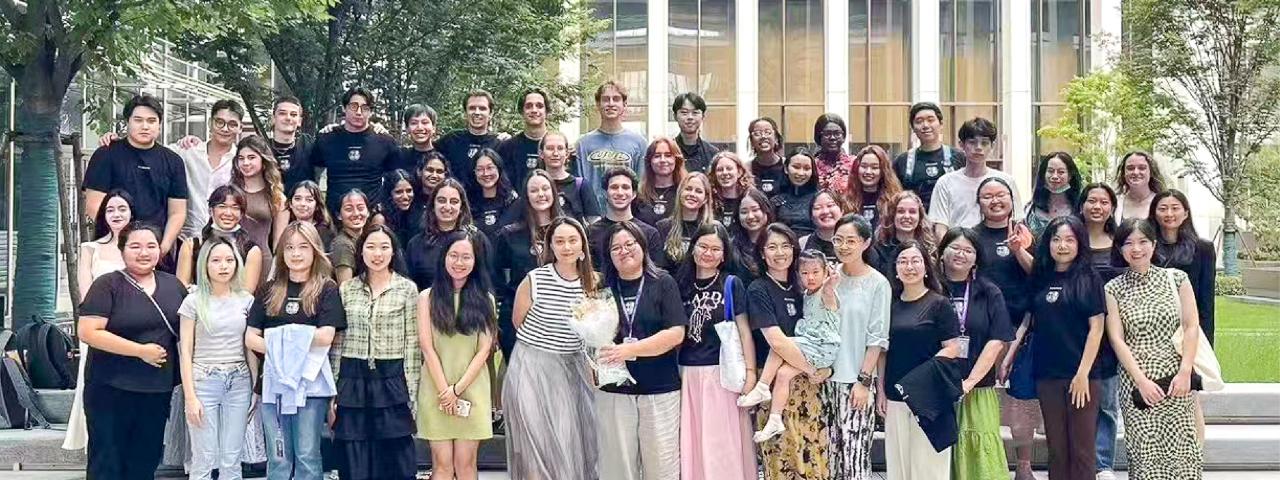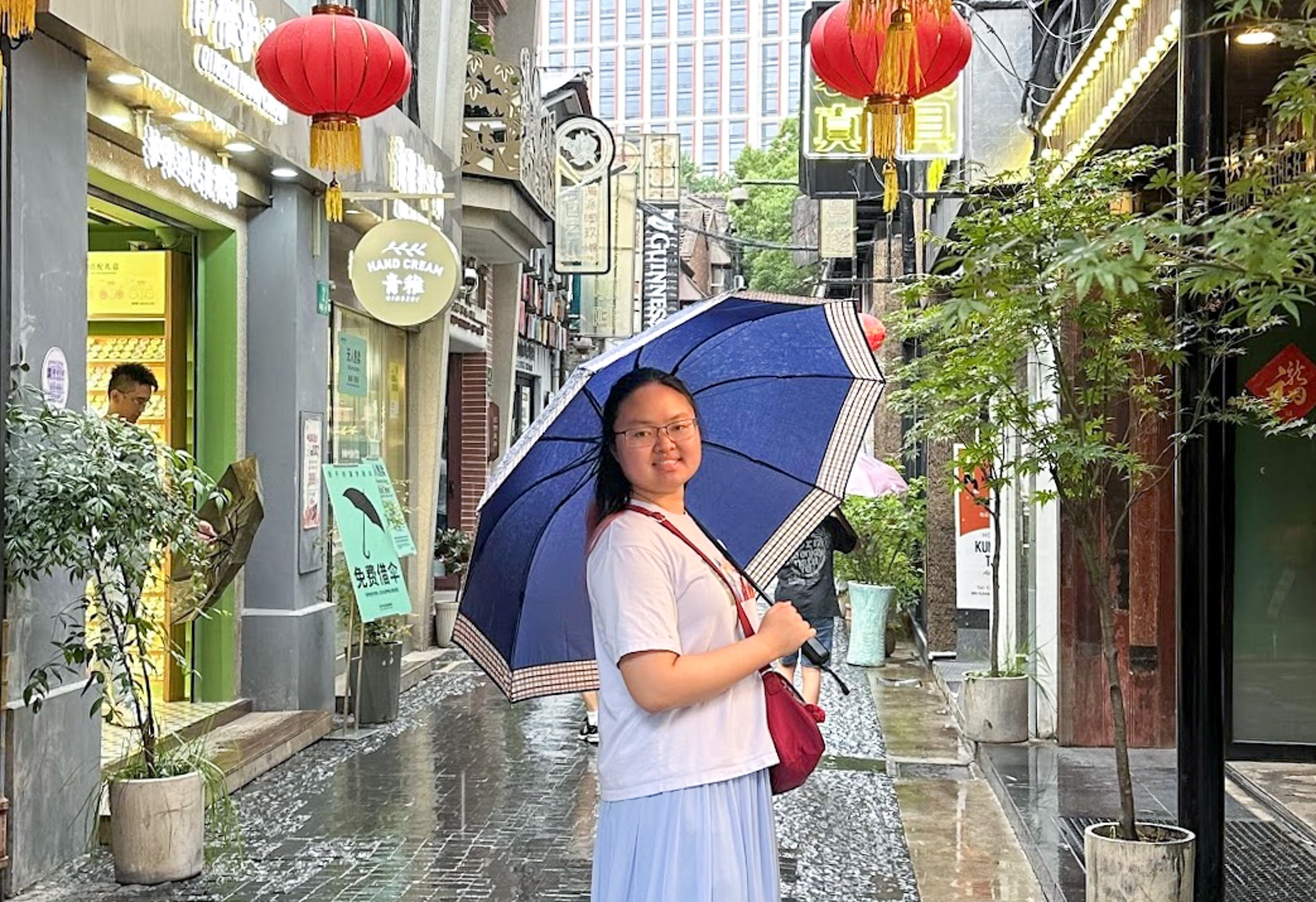
This summer, students from 14 countries convened on NYU Shanghai’s campus for nine weeks, promising to only speak Mandarin. In its sixth year running, NYU Shanghai’s Summer Chinese Language Immersion program brought together 42 students from seven universities in the US, including NYU in New York. Throughout the nine weeks, students immersed themselves in Chinese culture, visiting Huangshan Mountain in Anhui Province, taking architectural tours throughout Shanghai, and learning how to make Chinese dishes such as fried rice, eight treasure rice, and dumplings.
In addition to intensive daily lessons, the program also supports students to use Mandarin outside the classroom, engaging with Chinese teenagers and college students. They participate in a wide range of extracurricular activities, all in Chinese. Students can join a game of mahjong with local aunties and uncles, sample China’s diverse cuisines. For Dragon Boat Festival, students visited a nearby historic neighborhood to learn the art of making zongzi, a traditional sticky rice specialty.
We spoke with three student participants to learn more about how their language skills developed through the program and hear their tips and tricks for beginners learning Mandarin.

Amir Khamidullin ’27
Hometown: Ufa, Russia
University: NYU Shanghai
Languages Spoken: Russian, English, Mandarin Chinese

I want to use my Chinese skills to be able to connect Russian and Chinese businesses and eventually connect their economies. I think China is a unique country and Russia has a lot to learn from China. Being able to communicate between these two countries and cultures using Mandarin is my goal. However, learning the language at first was difficult. The set of characters in Mandarin is completely different. The challenge was that we had so much content to learn, and we needed to push ourselves out of our comfort zone by communicating only in Chinese.
Proudest Moment: Helping My Classmates
There were times when my classmates didn't understand the grammar when the professor was explaining it, but I was able to explain it to them using my knowledge about Chinese grammar. Looking back, I’d say that was my proudest moment because I was able to help my classmates. They were grateful for this, and the professor was happy, too.
Advice: Speak with Local People
Even if you can say only a few words, push yourself out of your comfort zone, even if you think that your Chinese is not that good. As soon as you start to speak with Chinese people as much as possible and learn from them, then your Chinese will just skyrocket immediately.

Jania Jones ’26
Hometown: Harlem, New York
University: NYU New York
Languages Spoken: English, Spanish, Mandarin Chinese
Living in the city, it’s inevitable to meet people coming from different countries and backgrounds. In Harlem, I would say my school was majority immigrant families, so I grew up around a lot of Spanish-speaking families as well. It’s a goal of mine eventually to become a polyglot. I feel like learning a new language connects you so well to other people. Oftentimes, I feel like a person's background or their identity separates us as people. But when you realize that you can speak the same language and connect with someone in that way, I think it immediately brings you closer to them.
Proudest Moment: Performing in Chinese
We had a talent show [and] my friends and I performed a Chinese lullaby called Bao Bei. That’s something I would have never done before. Participating in that not only made me feel happy because I could sing and understand the lyrics, but also because I felt confident enough to sing the song in Chinese and still have a good time and feel relaxed. The performance was indicative of my improvement in my Chinese ability, but also in my self-confidence.
Advice: Find Peer Support
It’s very easy to feel like you're really far behind when everyone else might have years of Mandarin language learning under their belt. Sometimes, there’s this fear that you won’t be able to catch up. So to combat this fear, I think finding people who are in a similar position as you are is really helpful. As long as I’m improving, I am content with myself. I think this mindset helped me a lot. I think I also realized language learning is not a race. We are all coming from different backgrounds and abilities. So just be steady with your progress.


Name: Minna Chow ’25
Hometown: Houston, TX
University: Cornell University
Languages Spoken: English, Mandarin Chinese
The vast majority of my family speaks Mandarin and only Mandarin. I've always wanted to better understand my relatives and therefore always wanted to learn but didn't really become seriously interested until I got into Chinese dramas, like Joy of Life (which you should all check out!) and Chinese history.
Growing up, I couldn't really point to anything we did that was specifically Chinese. I just thought everything we did at home was the "normal" way of doing things. It wasn't until I went to college and was exposed to different ways of life on a daily basis and compared those ways of life to what I saw around me back home, that I really understood that my normal is very different from other people's normal. I now think that there's no such thing as the "right" way to do things, there's just ways that work and ways that don't work.
Proudest moment: Communicating with Family
My proudest moment of the program actually came after the program, when I went to Jiangxi Province to visit my relatives. Because they don't speak English, I could only use Chinese to communicate with them — it really felt like a final exam! Thanks to the classes, I found myself able to talk about modern Chinese society and as a result could communicate with my relatives beyond the basic greetings and get-to-know-you questions. I was surprised by and very grateful for how much I could say.
Advice: Persevere and Take Care of Yourself
Learning Chinese is going to be frustrating and boring at times, and pushing through those moments is key to success. To tell you a secret, I wasn't the greatest student myself. It wasn't until I had the energy and determination to focus on my studies and really work at improvement, regardless of my anxieties, that I found my Chinese getting better and my Chinese classes becoming more interesting and fun. Consistently showing up yielded the best results.
At the same time, this might sound weird and slightly mom-like, but my biggest piece of advice for students learning Mandarin is to take care of your physical health. It is impossible to study well if you're not eating well or getting enough sleep.

